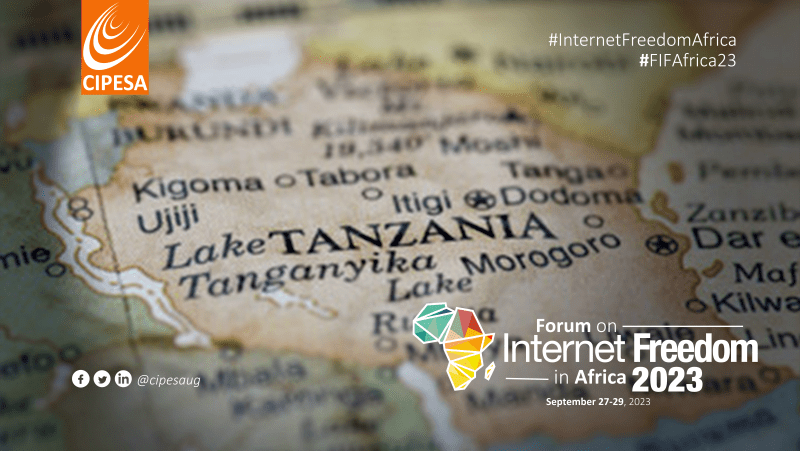Announcement |
The annual Forum on Internet Freedom in Africa (FIFAfrica) hosted by the Collaboration on International ICT Policy for East and Southern Africa (CIPESA) will be held in Dar es Salam, Tanzania on September 27-29, 2023. This year will mark a decade of the largest gathering on internet freedom in Africa, which has since 2014 put internet freedom on the agenda of key actors including African policy makers, platform operators, telcos, regulators, human rights defenders, academia, law enforcement representatives, and the media. This has paved the way for broader work on advancing digital rights in Africa and promoting the multi-stakeholder model of internet governance.
In several African countries, it is becoming increasingly challenging to utilise the internet to defend human rights, strengthen independent media, support democratisation, and demand accountable and transparent governance, or to freely access information and contribute content in the diversity of African languages. This is undermining the core principle of the internet as a free and open platform.
The decision to host the 2023 edition of FIFAfrica in Tanzania is in recognition of the country’s progressive shift to advance digitalisation for sustainable development. Under the leadership of its first female President, Samia Suluhu Hassan, a proponent for civil rights and women’s rights, the country has undergone political and legal reforms aimed at enhancing civic space and digitalisation agenda. Notably, a data protection law has been enacted, the law governing media operations is being revised, and the Online Content Regulations 2020 were revised to make them more supportive of online speech, privacy and access to information.
It is upon this backdrop that FIFAfrica 2023 will offer a platform for critical engagement of diverse stakeholders in identifying the most pressing internet rights-related issues and challenges that have to be addressed at national and regional levels. Over the years, FIFAfrica has identified opportunities for bringing the debate on the importance of digital rights to national, regional and global fora. In particular, the Forum supports the development of substantive inputs to inform a wide range of conversations at organisational, national, regional, continental and global levels, including at the African Union, the African Commission on Human and Peoples’ Rights (ACHPR), the United Nations Human Rights Council, the African Internet Governance Forum (IGF), sub-regional IGFs and at the global IGF.
The growth in diversity of participants and discussions at FIFAfrica reflects the evolving trends and concerns in access and usage of the internet and related technologies. Topics have included access to information, mass surveillance, turning policy into action, internet shutdowns, content regulation, cyber security, digital economy, online violence against women, data protection and privacy, cyber governance, open source investigative journalism, online movement building and civic building, business and big data, building research capacity in internet measurements, innovation and security in conflict territories, as well as gender-sensitive approaches to ICT Policy and decision making.
Overall, FIFAfrica is helping to grow the community advancing digital rights in Africa, increasing awareness about and advocacy for internet freedom, while forging new alliances that advance digital rights. It elevates new voices including those of often marginalised groups such as the youth, persons with disabilities and women, and enables state and non-state actors to develop evidence-based interventions that guide policy and practice
FIFAfrica has previously been hosted in Uganda, South Africa, Ghana, Ethiopia and Zambia, with the last edition attended by up to 1,000 individuals (online and offline) from 47 countries.
A call for proposals and travel support applications will be announced soon. For updates, follow CIPESA social media (@cipesaug) accounts on Twitter,Facebook and LinkedIn.

